Iranian FM Sets Ambitious Goal For Trade Relations With Turkey
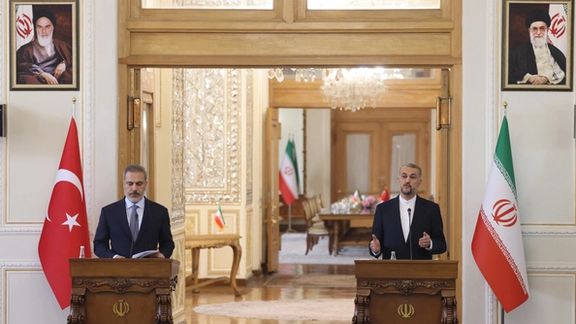
Iranian Foreign Minister Hossein Amir-Abdollahian met with his Turkish counterpart, Hakan Fidan, in Tehran to discuss the expansion of bilateral trade relations.

Iranian Foreign Minister Hossein Amir-Abdollahian met with his Turkish counterpart, Hakan Fidan, in Tehran to discuss the expansion of bilateral trade relations.
During the meeting, Amir-Abdollahian announced an ambitious goal of increasing trade between the two nations up to 30 billion euros.
The two foreign ministers reiterated their commitment to strengthening economic ties and agreed to sign a comprehensive agreement on trade cooperation.
Notably, during the presidency of Mahmoud Ahmadinejad, Iran and Turkey had previously agreed to increase bilateral trade to 30 billion dollars by 2016. However, recent official figures from Turkey reveal that the trade volume remains significantly lower, with total exports to Iran amounting to only 1.66 billion dollars in the first seven months of this year, and imports from Iran standing at 1.36 billion dollars.
Last year, the total bilateral trade between Iran and Turkey amounted to less than 6.4 billion dollars, underscoring the need for renewed efforts to achieve the ambitious trade target.
Meanwhile, Hakan Fidan, the Turkish Foreign Minister, emphasized the need for cooperation between Turkey and Syria in combating the Kurdish PKK group, recognized as a terrorist organization by Turkey, the European Union, and the United States. He called for increased collaboration between the Syrian government and Ankara on this issue.
Amir-Abdollahian echoed the importance of addressing Turkey and Syria's concerns related to terrorism, border security, and refugees through diplomatic dialogue, emphasizing respect for the sovereignty and territorial integrity of both countries.
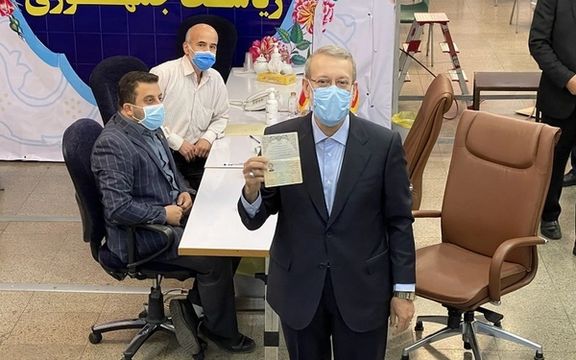
Some of Iran's high-profile politicians have spoken about the upcoming parliamentary elections in March 2024, albeit with a tone marked by bitterness.
Former parliamentary Speaker Ali Larijani made it clear in an interview with centrist website Entekhab that he is not going to run for parliament (Majles) in March. However, he said that he will explain his reasons for not taking part in the election at a later date.
Larijani's aides had said earlier that although he is not going to run himself, he will present a list of likeminded candidates including his brother-in-law, outspoken moderate conservative former lawmaker Ali Motahari who at times has even criticized Supreme Leader Ali Khamenei's policies.
Larijani who still harbors hard feelings about his disqualification in the 2021 Presidential election, criticized the current ultraconservative-dominated parliament and teasingly called its hardliner members "wheeling-dealing revolutionaries."
"They claim to be revolutionaries and they want to win all the positions in the government," Larijani said. He added that this group's presence in the Iranian politics dates back to the early days after the 1979 Islamic revolution. "They have always tried to create a bipolar situation and attempted to kick their political rivals out of the scene," he said.
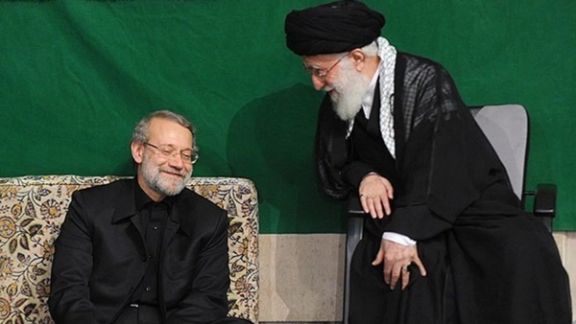
Larijani once again talked about his idea of political purification adding that this is a policy hardliners are advancing in order to ensure that others are excluded political competition and participation.
This purging, he said, will belittle the revolution and will inevitably lead to the disintegration and fragmentation of the nation.
However, Larijani charged that hardliners are furthering the idea of political purification to secure their personal and factional interests. They do not believe that positions of power should be held by individuals who have the right talent and capability for those posts.
Meanwhile, Khabar Online reported last week that Former President Mahmoud Ahmadinejad is also going to present a list of candidates for the Majles elections. However, according to the website, although Ahmadinejad and his aides will actively take part in presenting the list, their main objective is to secure a foothold for the 2025 Presidential election, when Ahmadinejad is hoping to have a political comeback.
For the Majles, Khabar Online wrote that Ahmadinejad's team may independently present a list of candidates for all the constituencies although they might decide at one point to come up with a shared list of candidates with one of the major conservative camps.
Like Larijani, Ahmadinejad has also tasted the bitter disqualification by Khamenei's Guardian Council in previous presidential elections. If they are ever allowed to run again, that would mean that Khamenei is desperate to have a high-turnout election.
In another development, conservative heavyweight Mohammad Reza Bahonar, who has repeatedly spoken with the media, warning about a low turnout, has once again lashed out at current lawmakers for their inefficiency, which he said has disappointed Iranian voters.
Bahonar, who like Larijani and Ahmadinejad, is a member of the expediency Council, said in an interview with Khabar Online that Khamenei usually issued an occasional warning about previous parliaments' performance, but he has warned the current parliament several times about various legislative matters.
Bahonar said that he has told Speaker Mohammad Bagher Ghalibaf that one of the main weaknesses of the current Majles is that it does not have a powerful minority faction. The lawmakers think they have no rivals and challenges ahead of them, and that they can do whatever they like.
Nonetheless, the Majles and the government are in a state of denial about almost everything. Vice President Mohammad Hosseini told the press on Friday that the previous government should be blamed for the low turnouts in recent elections, without presenting any evidence.

Owning a home in the Iranian capital Tehran has become virtually impossible while the key indicators of the quality of life are also in decline.
Iran's leading economic daily Donyaye Eqtesad (World of Economy) published an article Saturday listing a plethora of problems facing the residents of the capital.
The average time people needed to save money to be able to buy a residence in Tehran has increased to a staggering 112 years, from about 22 years in 2005. According to Donyaye Eqtesad, the period of time for those born since late 1990s -- the so-called generation Z -- is now estimated to be 200 years.
Economist Hassan Mansour told Iran International that the Housing Affordability Index is about four to 10 years in England, where housing prices are among the most expensive in the world. “This means there is no hope for Iranians to own a home,” he noted.
Last week, Mohsen Pirhadi, the vice-chairman of the parliamentary committee for Iran’s Seventh National Development Plan, said the government plans to reduce the timespan to 12 years in the next development plan. Despite launching seven development plans since the 1980s, to continue building infrastructure, establishing key industries, and expanding public services and education, which were fast expanding during the monarchy, Iran still remains classified as a developing country, with an average economic growth rate of only 2.5 percent during the Islamic Republic.
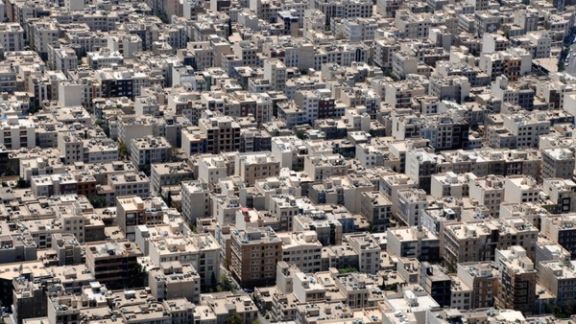
Donyaye Eqtesad released the new data after Tehran's city council members held a meeting with officials of the municipality and experts to mull over a comprehensive plan for the capital, comparing the current indicators about the city with those of 2005. Three major indicators of "quality of life" in Tehran have significantly deteriorated since then, with affordable housing, air pollution and urban decay being the main issues.
Amir Mansouri, a professor at the Faculty of Architecture at the University of Tehran, said during the meeting that "We live in a city where half of the population is in danger of devastating earthquakes, the price per square meter of housing exceeds 600 million rials (approximately $1,300), and ordinary people can no longer afford to buy a home in this city, even renting a place in some neighborhoods has become impossible.” The monthly minimum take-home pay (without benefits) is around $120.
Earlier reports in mid-2022 indicated that there was a more than 300 percent rise in rents in Tehran in a matter of three years. And figures released in December 2021, some six months after Ebrahim Raisi took office as President indicated that food and housing expenses had risen between 300 to 740 percent during the preceding six years while wages went up by around only 270 percent during the same period. A prominent economist, Hossein Raghfar, said earlier this year that high rents in Tehran have pushed many tenants to the less expensive margins of the capital where a new social sub-class is taking shape, with some people having chosen to live in makeshift houses built on some of Tehran's rooftops.
According to a report by reformist daily Shargh earlier this week, the Iranian government has exerted pressure on real estate advertising platforms to keep property prices hidden. The newspaper also noted that for the past eight months, the government has refrained from disclosing housing market data on the official portals of the Iranian Statistical Center and the Central Bank.
Mansouri added that the residents of the capital are exposed to polluted air for more than 200 days a year. Tehran has been logged as the most polluted city in the world for at least several days per year. The capital’s pollution is mainly blamed on poor government policies, desertification and low water levels, as well as climate change that has intensified sandstorms.
Moreover, the usage of highly polluting diesel and mazut fuels in power plants -- instead of natural gas -- jumped in Iran in 2021 on top of increases in previous years. Mazut -- commonly called waste oil -- is a heavy, low quality fuel oil, only used when the facilities to blend or break it down into more conventional petrochemicals such as diesel are not available.
Iran has the world’s second largest natural gas deposits but is unable to boost production because it lacks capital and Western technology. It needs to invest $40 billion in modernizing and expanding its gas fields, but most are in the Persian Gulf and need Western technology. Due to its anti-West foreign policy and an expanding nuclear program, Iran is under US sanctions and cannot borrow money or technology from the West.
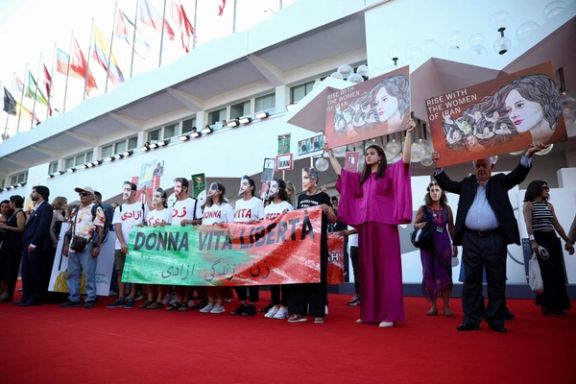
A movie about the Islamic Republic’s pressures on Iranian athletes not to face Israeli competitors is the first production co-directed by Iranian and Israeli filmmakers.
The film, which premiered at the Venice Film Festival, had to be shot in secret to prevent possible interference by Tehran, directors Zar Amir Ebrahimi and Guy Nattiv told Reuters on Sunday.
"Tatami", a tense thriller centered on a world judo championship, received a standing ovation during its premier at the weekend. The film takes place over the course of the single day of competition as an Iranian judoka champion, played by Farsi-speaking US actress Arienne Mandi, is ordered to fake an injury to avoid a possible match-up with an Israeli competitor, a scenario that has happened to several Iranian athletes in real life.
Amir Ebrahimi and Nattiv shot the movie in Georgia, a country Iranians can easily visit. They stayed in separate hotels, spoke English and did not let on that they were making such a politically charged film.
"I knew there are many Iranians there, so we were trying to keep it calm and secret," said Amir Ebrahimi, who is an award-winning actress who fled Iran in 2008.
Iran does not recognize Israel's right to exist and has forced athletes into intentionally losing matches, forfeiting games, or claiming injuries to evade encounters with Israeli competitors.
banned its athletes from competing against Israelis in an incident that inspired "Tatami", the International Judo Federation in 2021 gave Iran a four-year ban for pressuring one of its fighters not to face an Israeli.
Last week, a weightlifter was banned from the sport for life after posing for a photograph with an Israeli at the World Master Championships in Poland.
Over the past few years, approximately 30 Iranian athletes have defected from national teams and sought asylum in foreign nations.
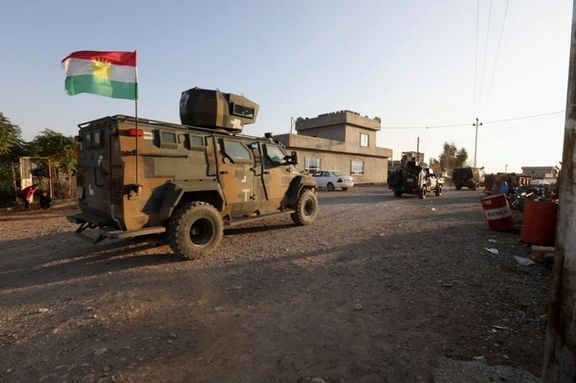
Iraqi security forces deployed in the northern city of Kirkuk on Sunday as Iran-backed militias have killed several Kurds and continue to threaten more attacks.
According to police and security sources, four Kurds were shot dead and 15 people were wounded during the clashes in the city, controlled by the Iraqi government and home to diverse groups of people including Kurds, Turkmens, and Arabs.
Amir Shwani, a spokesman for Kirkuk police, said in a statement that a curfew had been lifted and vehicles were moving normally in the city on Sunday, but security forces had deployed additional troops to "prevent violence and protect civilians."
The city has been a point of contention, witnessing disputes between Kurdish forces and the Iraqi government. Iranian-backed militias have recently escalated aggression in the region, firing rockets to target gas fields on the road to Sulaymaniyah, a large city in the Kurdistan autonomous region about 100 kilometers west of Kirkuk.
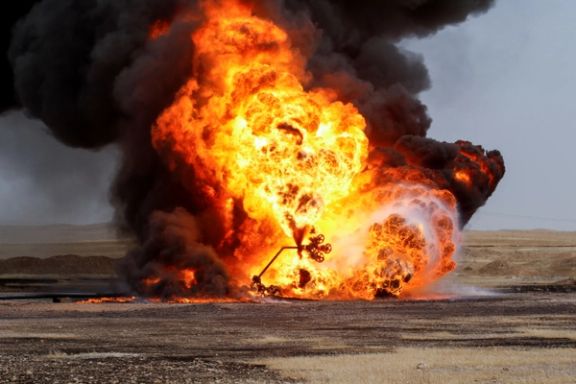
The clashes followed days of tensions over a building in Kirkuk that was once the headquarters for the Kurdistan Democratic Party (KDP) but was used by the Iraqi army as a base since 2017. Iraq's federal supreme court issued an urgent ruling on Sunday obliging the government to delay procedures regarding the handover of the building to the KDP.
Kirkuk, an oil-rich province in northern Iraq along the fault lines between the Kurdish autonomous region and areas controlled by Iraq's Shiite-dominated central government, has been the focus of some of the country's worst post-Islamic State violence. Arab residents and minority groups, who say they suffered under Kurdish rule, have protested the KDP's return to the city.
“Dozens of protesters, mainly members of the Iran-backed Asaib Ahl al-Haq militia and their supporters, have set up tents near the JOC headquarters since Sunday evening in protest to the potential return of the KDP. They have blocked access to the highway and vowed to continue their demonstration until [Prime Minister Shia al-Sudani retracts his decision,” Rudaw Kurdish news agency reported reported.
Similar clashes are also happening between Kurdish-led forces and groups of Islamic militias and tribes in eastern Syria. The violence has killed 49 fighters from both sides and eight civilians, according to the Syrian Observatory for Human Rights war monitor.
The involvement of the pro-Iran militias also has another dimension. Late in August, Iran and Iraq formalized an agreement to dismantle Iranian Kurdish dissident factions stationed in the northern reaches of Iraq and relocate them from their bases.
Nasser Kanaani, spokesperson for Iran's Foreign Ministry, said the Iraqi government had undertaken the commitment "to disarm the armed terrorist groups stationed in Iraq's territory by September 19, and subsequently, evacuate and transfer them from their military bases to camps designated by the Iraqi government."
Historically, Iran has intermittently executed targeted operations against the Kurdistan Democratic Party in Iran (KDPI) and other Iranian Kurdish dissident elements operating within Iraq's semi-autonomous Kurdish region, adjacent to Iran's borders.
Various Iranian dissident factions in Iraq have aligned their allegiances with the two principal Iraqi Kurdish parties: the Kurdistan Democratic Party, headquartered in Erbil, and the Patriotic Union of Kurdistan party, with its stronghold in Suleimaniyah.
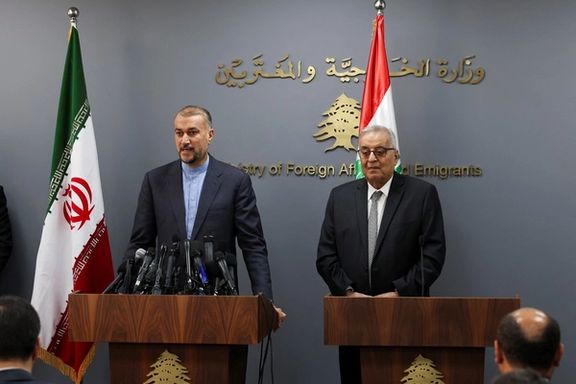
Iran's Foreign Minister Hossein Amir-Abdollahian says that last year there was a “September document” that brought Tehran and Washington close to a nuclear agreement.
The foreign minister, speaking to the semi-official Ettelaat newspaper in Tehran, argued that the anti-government protests, which erupted in September 2022, and issues related to the war in Ukraine set back a possible deal with the United States.
He claimed that the Biden administration first thought that the protests would lead to a revolution in Iran and rejected the deal, but soon began sending secret messages that “we are ready to conclude the JCPOA talks.”
Amir-Abdollahian was referring to US statements in October 2022 that the 2015 JCPOA nuclear deal was no longer their focus and they were preoccupied with defending the rights of protesting Iranians.
He added that the recent Iran-US agreement to release a part of Iran's frozen assets abroad as part of a prisoner swap deal may help further the nuclear talks.
Robert Malley, the former US envoy for Iran told CNN on October 17, that "Right now the talks on revival of JCPOA are not on the US agenda; the focus is on what's happening in Iran as the talks are stalled," adding that “Iran has taken a position in those talks for the past two months, which is simply inconsistent with a return to the deal.”
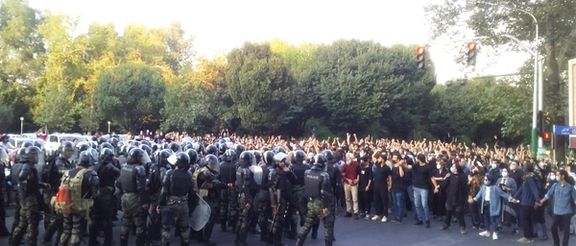
IN January, Iran International reported that Malley had held secret meetings with Iran's envoy to the United Nations in New York in December. When asked at the time, the State Department did not deny the report, instead it confirmed that messages were being exchanged with Tehran. Therefore, Amir-Abdollahian's account that the Biden administration soon changed its tune about nuclear talks as protests were taking place in Iran seems to reflect the reality.
Malley has since been suspended without pay in what is reported to be an investigation by the FBI regarding possible violations of his security clearance privileges.
Amir-Abdollahian told Ettelaat that presently “The Sultan of Oman has put forth an initiative and we held indirect talks with the Americans…Now we have two documents on the table; one is about the release of Iran’s [frozen] funds,” but he did not elaborate on the second document. He went on to say that the JCPOA is not off the table, although it was perhaps “not a great agreement.”
Various media sources have reported that Tehran and Washington are discussing an unofficial deal, whereby Iran would limit its uranium enrichment and Washington would agree to the release of all funds frozen in several countries totalling around $20 billion.
Before this interview, Amir-Abdollahian in a press conference in Beirut on Friday had said that the deal with the US to release American prisoners and Iran’s funds can help advance the nuclear talks. He had also mentioned that the Sultan of Oman has tabled an initiative and Iran and the United States have already started exchanging messages.
Asked whether this can lead to the revival of the 2015 nuclear deal (JCPOA), Amir-Abdollahian said that Qatar and Oman and furthering the talks. "We have always been following the route of diplomacy and negotiations. Naturally, if the prisoner swap and the deal over releasing Iran's assets work well, this will help the lifting of the sanctions."
He stressed that Iran has the will to return to its commitments under the JCPOA and to follow diplomacy to have the sanctions lifted.
Meanwhile, he denied reports about his meeting with a US official in Beirut and said: "Some media like to link different matters."
Clearly, the Islamic Republic is under severe domestic pressure to lift US sanctions to address its deteriorating economic situation.
While some Iranian officials close to the Raisi administration are upbeat about Iran's upcoming membership in BRICS, Etekhab website wrote in an analysis: "For a country that is under the most severe economic sanctions, believing in lackluster alliances is like a nightmare."
"These sanctions have left Iran breathless as its allies will take advantage of Iran's confrontation with regional and international powers," Entekhab added that overestimating what BRICS can do for Iran is unrealistic. The website added that the Raisi administration is not fully aware of the implications of its membership in organizations such as BRICS or Shanghai Cooperation Organization.
Updated on Sept. 4 at 10:00 GMT






